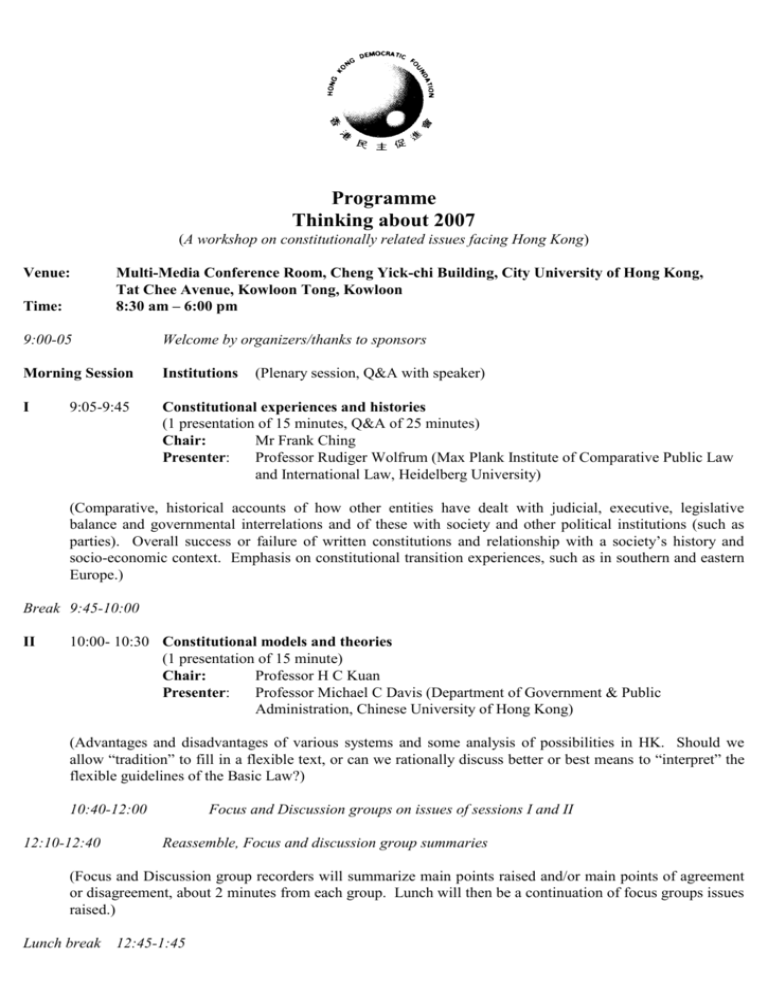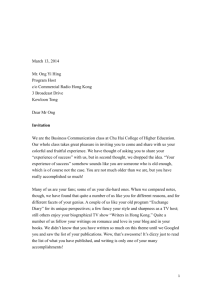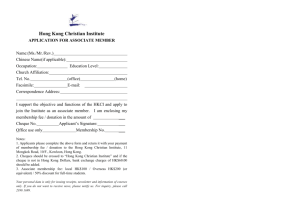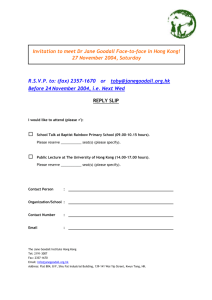PRESS CONFERENCE INVITATION
advertisement

Programme Thinking about 2007 (A workshop on constitutionally related issues facing Hong Kong) Venue: Time: Multi-Media Conference Room, Cheng Yick-chi Building, City University of Hong Kong, Tat Chee Avenue, Kowloon Tong, Kowloon 8:30 am – 6:00 pm 9:00-05 Welcome by organizers/thanks to sponsors Morning Session Institutions I Constitutional experiences and histories (1 presentation of 15 minutes, Q&A of 25 minutes) Chair: Mr Frank Ching Presenter: Professor Rudiger Wolfrum (Max Plank Institute of Comparative Public Law and International Law, Heidelberg University) 9:05-9:45 (Plenary session, Q&A with speaker) (Comparative, historical accounts of how other entities have dealt with judicial, executive, legislative balance and governmental interrelations and of these with society and other political institutions (such as parties). Overall success or failure of written constitutions and relationship with a society’s history and socio-economic context. Emphasis on constitutional transition experiences, such as in southern and eastern Europe.) Break 9:45-10:00 II 10:00- 10:30 Constitutional models and theories (1 presentation of 15 minute) Chair: Professor H C Kuan Presenter: Professor Michael C Davis (Department of Government & Public Administration, Chinese University of Hong Kong) (Advantages and disadvantages of various systems and some analysis of possibilities in HK. Should we allow “tradition” to fill in a flexible text, or can we rationally discuss better or best means to “interpret” the flexible guidelines of the Basic Law?) 10:40-12:00 12:10-12:40 Focus and Discussion groups on issues of sessions I and II Reassemble, Focus and discussion group summaries (Focus and Discussion group recorders will summarize main points raised and/or main points of agreement or disagreement, about 2 minutes from each group. Lunch will then be a continuation of focus groups issues raised.) Lunch break 12:45-1:45 Afternoon Session Processes III Electoral systems and parties (2 presentations of 10 minutes each) Chair: Dr Anthony Cheung Bing-leung Presenter: Professor David Farrell (Department of Government, University of Manchester) Presenter: Professor Nigel Roberts (School of Political Science and International Relations, Victoria University of Wellington) 2:00-2:30 (Summaries of effects, advantages, and disadvantages of various electoral systems. Role of parties in getting out vote, socialization of citizens, interest identification and so on.) 2:40-4:00 Focus and Discussion groups on issues of session III Break 4:00-4:15 4:15-4:45 Reassemble, Focus and Discussion group summaries (Focus and Discussion group recorders will summarize main points raised and/or main points of agreement or disagreement, about 2 minutes from each group.) IV 4:45-5:30 Participatory processes and public-government interactions (Panel will consist of Hong Kong representatives, 1 main speaker for 10 minutes on the issue, then plenary Q&A and audience suggestions/interactions with speakers and each other). Chair: Dr Jane Lee Presenter: Mr Peter Manikas (Senior Associate & Regional Manager, of Southern Africa Programmes National Democratic Institute of International Affairs, USA) Discussants: Christine Loh (Civic Exchange) Dr Michael DeGolyer (Hong Kong Transition Project) (Broad principles of government-citizen interaction in a democracy and specific examples of practices for involving citizens in politics and decision-making) V 5:30-5:45 Ways forward and thanks (Open plenary forum taking suggestions for follow-up, invitation to participate in web-based discussion once the green paper from this workshop is online, and perhaps invitation to subscribe to newslist/discussion group on constitutional affairs?) Focus and Discussion Groups To maximize interaction: after presentations, we will break into six Focus groups of 15 pre-invited persons each and two Discussion groups (one Chinese language and one English language) to accommodate the rest of the audience. Each Focus and Discussion group will have its own facilitator and a separate recorder to record the essence of comments and report back to the main meeting. 10 minutes to assemble in Focus and Discussion groups, 60 minutes for discussion, 10 minutes to reassemble in larger group, for 80 minutes total. 30 minutes to deliver summaries of each of the groups (about 2 minutes for each smaller group, with written notes collected at end)








